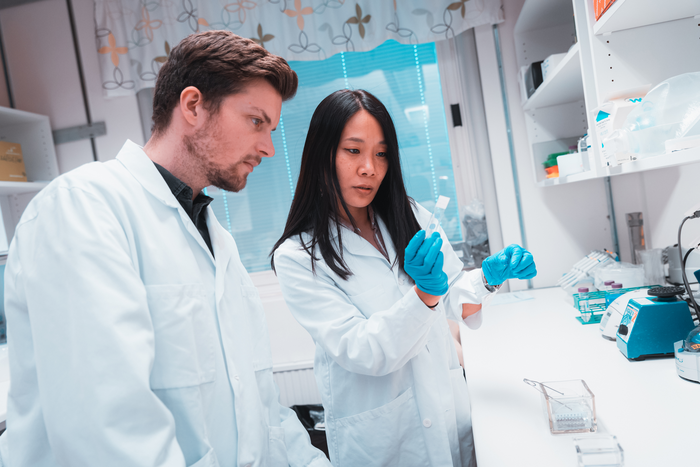Researchers at Linköping University, Sweden, have discovered a biological mechanism that increases the strength with which fear memories are stored in the brain. The study, carried out in rats, is published in the scientific journal Molecular Psychiatry. It provides new knowledge on the mechanisms behind anxiety-related disorders, and identifies shared mechanisms behind anxiety and alcohol dependence.

Credit: Anna Nilsen/Linköping University
Researchers at Linköping University, Sweden, have discovered a biological mechanism that increases the strength with which fear memories are stored in the brain. The study, carried out in rats, is published in the scientific journal Molecular Psychiatry. It provides new knowledge on the mechanisms behind anxiety-related disorders, and identifies shared mechanisms behind anxiety and alcohol dependence.
The ability to experience fear is essential to escape life-threatening situations and to learn to avoid them in the future. In some conditions, however, such as post-traumatic stress disorder (PTSD) and other anxiety-related disorders, the fear reactions become excessive, and persist even when they are no longer appropriate. This triggers intense anxiety even though the danger is no longer present, and leads to disability for the person who is affected. Researchers suspect that certain individuals have a greater tendency to develop pathological fears, and that this is caused by disorders in the way that the brain processes fearful memories.
Some areas of the brain are particularly important for processing fear-related memories. The amygdala is activated when threats are experienced, and works together with parts of the frontal brain lobes, the “prefrontal cortex”, which are important for regulating emotions.
“We know that the network of nerve cells that connects the frontal lobes to the amygdala is involved in fear responses. The connections between these brain structures are altered in people with PTSD and other anxiety disorders,” says Estelle Barbier, assistant professor in the Center for Social and Affective Neuroscience (CSAN), and the Department of Biomedical and Clinical Sciences (BKV) at Linköping University, who led the study.
However, the molecular mechanisms involved have long remained unknown. The researchers in the current study have investigated a protein known as PRDM2, an epigenetic enzyme that suppresses the expression of many genes. The researchers have previously found that levels of PRDM2 are lower in alcohol dependence, and lead to exaggerated stress responses. In people, it is very common for alcohol dependence and anxiety-related conditions to be present at the same time, and the researchers suspect that this is caused by common mechanisms behind these conditions.
In order for new memories to last, they must be stabilised and preserved as long-term memories. This process is known as “consolidation”. The researchers in the current study have investigated the effects of reduced levels of PRDM2 on the way fear memories are processed.
“We have identified a mechanism in which increased activity in the network between the frontal lobes and the amygdala increases learned fear reactions. We show that down-regulation of PRDM2 increases the consolidation of fear-related memories,” says Estelle Barbier.
The researchers have also identified genes that are affected when the level of PRDM2 is reduced. It became clear that this resulted in an increase in the activity of nerve cells that connect the frontal lobes and the amygdala.
“Patients with anxiety disorders may benefit from treatments that weaken or erase fear memories. The biological mechanism that we have identified involves down-regulation of PRDM2, and we currently do not have any way of increasing it. But the mechanism may be part of the explanation of why some individuals have a greater vulnerability to developing anxiety-related conditions. It may also explain why these conditions and alcohol dependence so often are present together,” says Estelle Barbier.
This work was funded by the Swedish Research Council, Region Östergotland, Stiftelsen Psykiatriska Forskningsfonden, the Wallenberg Foundations and the Knut och Alice Wallenberg Foundation.
The article: An epigenetic mechanism for over-consolidation of fear memories, Riccardo Barchiesi, Kanat Chanthongdee, Michele Petrella, Li Xu, Simon Söderholm, Esi Domi, Gaelle Augier, Andrea Coppola, Wiskerke Joost, Szczot Ilona, Ana Domi, Louise Adermark, Eric Augier, Claudio Cantù, Markus Heilig and Estelle Barbier, (2022), Molecular Psychiatry, published online on September 21, 2022, doi: 10.1038/s41380-022-01758-6
Journal
Molecular Psychiatry
DOI
10.1038/s41380-022-01758-6
Method of Research
Experimental study
Subject of Research
Animals
Article Title
An epigenetic mechanism for over-consolidation of fear memories
Article Publication Date
21-Sep-2022
COI Statement
The authors declare no competing interests.




